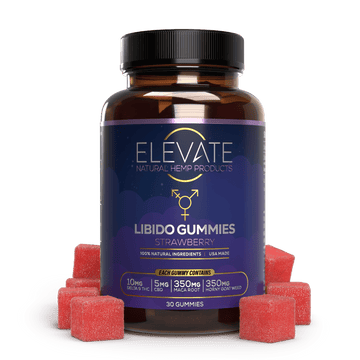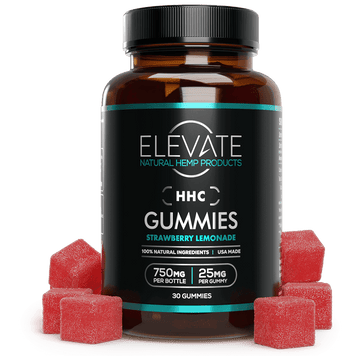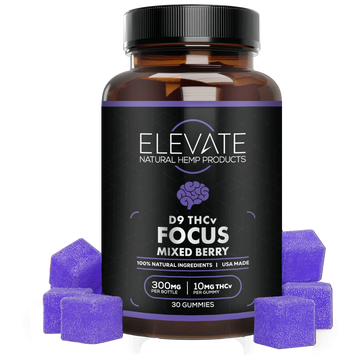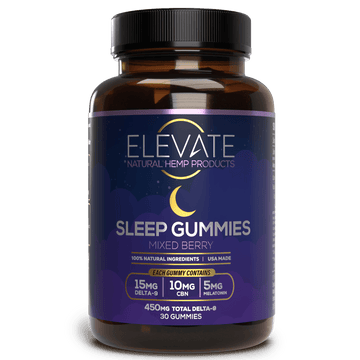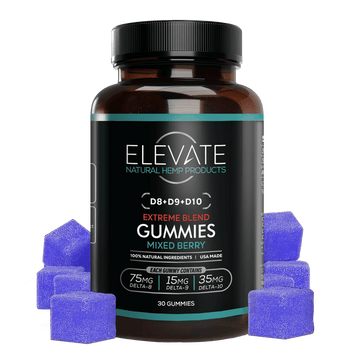Cannabinoid THCP vs. THCO: What You Need to Know

THCP vs THCO:
- THCP: Naturally occurring, up to 33x more potent than Delta 9
- THCO: Synthetic acetate, roughly 3x more potent than Delta 9
- Both require careful dosing due to high potency
- THCP effects last longer; THCO has delayed onset
- THCO faces more legal scrutiny as a synthetic
Table of Contents
- What Is the THCP Cannabinoid?
- What Are the Potential Benefits of THCP?
- And What About the THCO Cannabinoid?
- What Are the Potential Benefits of THCO?
- THCP vs. THCO: What's the Difference?
- Your Guide to Choosing Between THCP and THCO
- THCP vs. THCO: Which Cannabinoid Should You Choose?
- Frequently Asked Questions
- Key Takeaways
- Related Articles
If you’re looking for a more powerful cannabis experience, you’ve likely heard the buzz around THCP and THCO. These aren't your average cannabinoids; they represent the next level of potency, each offering a uniquely intense journey. But with great power comes the need for great information. THCP offers a supercharged version of a traditional high, while THCO is often described as more spiritual or psychedelic. Understanding the key differences is crucial for a safe and positive experience. This article is your straightforward guide to the cannabinoid THCP THCO, comparing their strength, effects, origins, and safety so you can make an informed choice.
In this blog, we’ll break down what makes THCP and THCO stand out, exploring their origins, effects, and why they’re causing a stir among cannabis enthusiasts. Whether you're curious or a connoisseur, these cannabinoids offer a fresh perspective on cannabis.
What Is the THCP Cannabinoid?
THCP, or tetrahydrocannabiphorol, is a naturally occurring cannabinoid found in the cannabis plant. It is structurally similar to THC, the primary psychoactive compound in cannabis, but features a longer alkyl side chain, which significantly enhances its affinity for CB1 and CB2 receptors in the brain. This molecular difference potentially makes THCP far more potent than THC.
Early research suggests that THCP could have several times the psychoactivity of THC, indicating it might be more effective at lower doses. Its discovery has opened new avenues for exploring therapeutic potentials and understanding cannabis's pharmacological effects.
Where Does THCP Come From?
The story of THCP is a fascinating blend of natural discovery and modern science. While it exists in nature, its journey to becoming a product you can actually use is a bit more complex. Understanding where it comes from helps explain why it’s gaining so much attention and why it’s different from more common cannabinoids like Delta-9 THC or CBD.
Natural Occurrence vs. Lab Production
THCP is a cannabinoid that was only recently discovered in the cannabis plant in 2019. It occurs naturally, but only in extremely small quantities. Because the concentration is so low, extracting THCP directly from cannabis for commercial use isn't practical. Instead, the THCP found in most products is created in a laboratory. Scientists use a chemical process to convert more abundant, hemp-derived cannabinoids, like CBD, into THCP. This method allows for a pure, consistent, and accessible supply, making it possible for people to experience its unique properties without needing a whole field of cannabis for a single dose.
How Strong is THCP?
The main reason THCP is making waves is its incredible potency. When people talk about its strength, they’re referring to its powerful interaction with the body's endocannabinoid system. This isn't just about a more intense high; it's about how efficiently the molecule works within your body, which could mean different effects and a longer-lasting experience compared to what you might be used to with traditional THC.
Potency, Binding Affinity, and Duration
Research shows that THCP binds to the brain's CB1 receptors approximately 33 times more effectively than Delta-9 THC. This powerful connection means that even a small amount of THCP can produce significant effects. While this doesn't mean the experience is 33 times stronger, it does suggest a much higher psychoactivity level. For some, this could translate to more pronounced relief from pain or a stronger appetite. A key difference is also its duration; the effects of THCP can last much longer than THC, sometimes up to 24 hours. This extended timeline is something to keep in mind, especially if you're exploring options like THC for sleep and want to understand how different cannabinoids might affect you the next day.
What Are the Potential Benefits of THCP?
THCP (tetrahydrocannabiphorol) is gaining attention for its potent effects and potential therapeutic benefits. This cannabinoid, which is similar to THC but potentially much more powerful due to its unique chemical structure, offers several promising avenues for medical and wellness applications.
Here are some of the potential benefits of THCP that are currently being explored:
Finding Relief from Pain
Due to its strong affinity for CB1 receptors in the brain, which play a significant role in the modulation of pain, THCP could offer more effective pain relief compared to other cannabinoids. This could make it particularly useful for individuals with chronic pain conditions that are not adequately managed by conventional treatments.
Stimulating Your Appetite
Like THC, THCP may also help to stimulate appetite. This can be beneficial for patients suffering from conditions like cancer or HIV/AIDS, where appetite loss and associated weight loss are common issues.
Protecting Your Brain Health
Early studies suggest that cannabinoids like THCP could have neuroprotective effects. This means THCP could potentially be used in the treatment of neurodegenerative diseases such as Alzheimer's and Parkinson's by helping to preserve neural function and slow disease progression.
Fighting Inflammation Naturally
The anti-inflammatory properties of cannabinoids are well-documented, and THCP is no exception. Its potent effects could prove to be more efficient in reducing inflammation, which is beneficial in treating a variety of inflammatory conditions such as arthritis.
Easing Anxiety and Depression
The potential for THCP to act on the endocannabinoid system also suggests it might help regulate mood and anxiety levels. This could make it a valuable compound for addressing mental health issues like anxiety and depression.
Can It Help You Sleep Better?
Due to its potent psychoactive effects, THCP might help in managing sleep disorders, such as insomnia, by inducing a state of relaxation and helping to prolong sleep duration.
And What About the THCO Cannabinoid?
THCO, or tetrahydrocannabinol acetate, is a synthetic cannabinoid derivative created by modifying THC through a process called acetylation. This chemical alteration enhances the potency and duration of its effects compared to its natural counterpart, THC. THCO is known for providing a more intense, sometimes psychedelic experience.
It is often described as being several times stronger than regular THC, leading to heightened sensory perception and prolonged psychoactive impacts. Due to its synthetic nature and potency, THCO occupies a complex legal and safety profile, making its use and distribution subject to varying regulations.
Where Does THCO Come From?
A Look at Synthetic Production
Unlike cannabinoids that grow naturally in the cannabis plant, THCO is a man-made substance. It doesn't exist in nature; instead, it’s created in a laboratory by chemically altering THC. This process, known as acetylation, modifies the THC molecule, which is what gives THCO its distinct and powerful characteristics. This lab-based origin is important to understand because it means THCO’s properties are engineered, resulting in effects that are different from what you might experience with cannabinoids extracted directly from the plant. The synthesis allows for a compound that is not only more potent but also has a different interaction with your body's endocannabinoid system.
How Strong is THCO?
Potency, Onset Time, and Reported Effects
THCO is known for its impressive strength, often reported to be about three times more potent than traditional THC. This increased potency means its effects can be much more intense and also tend to last longer. One key difference is its delayed onset; it can take a bit more time to feel the effects compared to other cannabinoids. Users often describe the experience as more spiritual or introspective, with some even noting mild psychedelic effects, though this is based on personal accounts. Beyond its unique high, common reported effects include feelings of happiness, deep relaxation, and pain relief, similar to what you might find with other THC products like Delta 9 gummies.
What Are the Potential Benefits of THCO?
THCO has been gaining attention for its potential benefits, which could extend beyond those typically associated with natural cannabis compounds. Here are some potential benefits of THCO:
A More Potent Experience
THCO is reported to be significantly more potent than THC, which means it may require smaller doses to achieve the desired therapeutic effects. This can be particularly beneficial for patients who need strong relief from symptoms but want to minimize their intake of cannabinoids.
Effects That Go the Distance
The effects of THCO are often described as longer-lasting compared to those of THC. This can be advantageous for individuals seeking prolonged symptom relief without the need to frequently re-dose.
A New Approach to Pain Management
Due to its potent psychoactive effects, THCO might be effective in managing chronic pain, particularly in cases where other pain relief methods have failed.
Settling Your Stomach
Like THC, THCO may help reduce nausea and vomiting, especially in patients undergoing treatments like chemotherapy.
Bringing Back Your Appetite
THCO could help stimulate appetite in individuals who have lost their desire to eat due to medical conditions or treatments.
Exploring the Mental Effects
Some users report that THCO provides a unique, profound psychoactive experience, which might include enhanced mood, relaxation, and possibly a beneficial shift in perspective for those dealing with mental health issues like depression or anxiety.
THCP vs. THCO: What's the Difference?
When comparing THCP and THCO, it's essential to evaluate them across various factors to understand their distinct characteristics and potential applications. Here’s a detailed comparison based on several key aspects:
Source and Production
The origins of THCP and THCO are a primary point of difference. THCP is a cannabinoid that occurs naturally in cannabis plants, but only in trace amounts. Because it's so rare, it’s not practical to extract it directly from the plant for commercial products. Instead, most of the THCP you’ll find is created in a lab by chemically altering CBD derived from legally grown hemp. In contrast, THCO is entirely synthetic; it doesn’t exist in the cannabis plant at all. It’s produced through a chemical process called acetylation, where acetic anhydride is added to THC molecules. This fundamental difference—natural but rare versus purely lab-created—impacts everything from their legal status to how they are perceived by consumers.
Potency and Onset of Effects
When it comes to strength, both cannabinoids pack a serious punch, but in different ways. THCP is incredibly potent because it binds to the brain's cannabinoid receptors about 33 times more effectively than traditional THC. This means its effects can feel much more intense and last significantly longer, even with a small dose. On the other hand, THCO is also reported to be much stronger than THC, but its onset is delayed. It acts as a prodrug, meaning your body has to metabolize it before you feel anything. This process can take a while, so it’s important to be patient and avoid re-dosing too quickly, as the effects can sneak up on you with surprising intensity.
Reported User Experiences
The experiences people report with THCP and THCO are quite distinct. Users often describe THCP as a supercharged version of the classic THC high—think heightened feelings of happiness, deep relaxation, and altered senses, but all amplified. Because of its strength, starting with a very low dose is key to having a good experience. THCO, however, is often described in more unique terms. Many report a more profound, almost spiritual or psychedelic experience that includes mood enhancement and a fresh perspective. While we focus on providing tailored solutions with products like our libido-enhancing gummies or formulas to help you sleep, understanding these powerful cannabinoids helps you make informed choices about your cannabis journey.
Your Guide to Choosing Between THCP and THCO

When considering the use of newer cannabinoids like THCP and THCO, consumers should be well-informed about their properties, potential benefits, and risks. Here’s a detailed consumer guide to help navigate the complexities of THCP and THCO:
What You Need to Know About Each Cannabinoid
THCP (Tetrahydrocannabiphorol): A naturally occurring cannabinoid, THCP is similar to THC but has a longer side chain, which may increase its affinity for cannabinoid receptors, potentially making it more potent.
THCO (Tetrahydrocannabinol Acetate): A synthetic analog of THC, THCO is modified through acetylation, enhancing its potency and prolonging its effects.
Comparing Their Potential Benefits
THCP: Could be effective for severe pain management, providing stronger and potentially longer-lasting relief.
THCO: Known for its strong psychoactive effects, it may be useful for users seeking a more intense experience or those with conditions that require potent treatment options.
Staying Safe: Potential Side Effects
Be Cautious with Dosages: Both THCP and THCO are more potent than regular THC, which means they should be used conservatively, especially by those new to cannabis products.
Potential Side Effects: High doses of THC analogs can lead to uncomfortable psychoactive experiences, including paranoia, anxiety, and disorientation. Starting with a low dose and going slow is key to finding a comfortable and effective level.
A Critical Safety Warning for THCO Consumption
It's important to understand that THCO is a synthetic compound, meaning it’s created in a lab rather than extracted directly from the plant. This process results in a cannabinoid that is significantly more potent than traditional THC, often delivering a more intense and sometimes psychedelic experience. Because of its strength and synthetic origins, the effects can be powerful and long-lasting. If you're considering THCO, it’s crucial to start with an extremely small dose to see how your body reacts. This isn't the time to be brave; respecting its potency is key to a safe and positive experience.
Managing the Risks of High-Potency THCP
While THCP is found naturally in cannabis, its high potency comes with its own set of considerations. Because it binds so effectively to your cannabinoid receptors, taking too much can amplify the less desirable effects of THC, such as anxiety, paranoia, or a rapid heart rate. The research on THCP is still in its early stages, so we don't have a full picture of its long-term effects. The best approach is caution. If you decide to try THCP, begin with the lowest possible dose and wait to see how you feel before considering more. This helps you find your personal sweet spot without overdoing it.
Drug Testing and Cannabinoid Use
Here’s the bottom line: if you are subject to drug testing, you should avoid both THCP and THCO. Standard drug tests are designed to detect THC metabolites, and because these cannabinoids are structurally similar to THC, they will almost certainly trigger a positive result. There's no reliable way to clear them from your system quickly, and most tests can't distinguish between different types of THC analogs. It's better to be safe and stick to products you know won't interfere with your employment or other obligations, such as broad-spectrum CBD gummies.
How to Shop for Quality Products
Choose Reputable Sources: Given the synthetic nature of THCO and the newness of THCP, it's crucial to purchase these compounds from reputable vendors who provide third-party testing results to verify purity and potency.
Look for Product Labels: Products should clearly state the cannabinoid content, including the amounts of THCP and THCO, and should provide information on the extraction or synthesis methods used.
Decoding the Certificate of Analysis (COA)
When you're exploring powerful cannabinoids like THCP and THCO, think of the Certificate of Analysis (COA) as your product's report card. This document, issued by an independent third-party lab, is your proof that a product is safe, pure, and contains exactly what the label says it does. Given the strength of these compounds, you absolutely want to shop from brands that provide these reports. A COA verifies the cannabinoid content, confirming the potency you're expecting, and ensures the product is free from harmful contaminants like pesticides, heavy metals, or residual solvents left over from the production process. It’s the best way to make sure you’re getting a high-quality product you can trust.
Finding the Right Way to Consume
Vaping and Oils: THCP and THCO are often available in vape cartridges or as oils. These methods allow for controlled dosages and are among the quickest ways to experience effects.
Edibles: Because of their potent nature, consuming THCP and THCO in edible form can result in prolonged and intense effects. It’s essential to carefully monitor dosage.
Is THCP or THCO Right for You?
Experience Level: Novice users should be particularly cautious with these potent cannabinoids, possibly starting with more familiar THC products.
Purpose of Use: Understanding whether the use is for recreational enjoyment or specific medicinal benefits can guide dosage and product selection.
Checking the Local Laws
Check Local Laws: The legality of THCP and THCO can vary significantly depending on the region and the source of the cannabinoids (hemp-derived vs. marijuana-derived). Always ensure you're compliant with local regulations.
Is THCO Legal?
The legal status of THCO is tricky, primarily because it's a synthetic compound. Unlike cannabinoids extracted directly from the plant, THCO is created in a lab, which places it in a legally complicated position. Its synthetic nature and high potency mean that its use and sale are subject to a patchwork of different regulations across the country. Because it doesn't occur naturally, it often faces stricter scrutiny than other hemp-derived products. Before you consider trying THCO, it's absolutely essential to research your state and local laws, as they can change frequently and vary significantly from one jurisdiction to another.
Is THCP Legal?
THCP's legal situation is also complex, but for different reasons. Since THCP is a naturally occurring cannabinoid, it often falls under the protection of the 2018 Farm Bill, which legalized hemp and its derivatives on a federal level. However, its intense psychoactive effects have put it on the radar of lawmakers, and there's a possibility that regulations could tighten in the future. It's also important to remember that state laws can override federal guidelines. Some states have already moved to ban or restrict potent, hemp-derived cannabinoids, so you'll need to check your local regulations to be sure.
When to Seek Professional Advice
Navigating the world of potent cannabinoids like THCP and THCO can feel overwhelming, and it's smart to prioritize your well-being. If you're feeling unsure about which product is the right fit for you, it's always a good idea to talk to a medical marijuana provider or a healthcare professional knowledgeable about cannabis. They can offer personalized guidance based on your health history, help you understand potential interactions with medications, and recommend a product and dosage that aligns with your specific goals, whether you're looking for something to help with sleep or manage discomfort. Getting expert advice is a responsible step for anyone, from beginners to seasoned users, when exploring powerful new compounds.
THCP vs. THCO: Which Cannabinoid Should You Choose?
THCP and THCO represent significant advancements in cannabinoid science, each promising distinct experiences and benefits due to their potent nature. For those interested in delving into the potent spectrum of cannabis derivatives, these cannabinoids provide exciting opportunities but also require a responsible approach.
It's crucial to approach these powerful compounds with an understanding of their intense effects and the legal landscape that surrounds them. As research continues to unfold, the profiles of THCP and THCO will become clearer, potentially opening new avenues for both therapeutic and recreational use. For now, consumers must navigate these waters carefully, ensuring they adhere to legal guidelines and prioritize their health and safety.
Frequently Asked Questions
In simple terms, what's the main difference in how THCP and THCO will make me feel? Think of THCP as an amplified version of a traditional cannabis high. The feelings of relaxation or euphoria you might be used to with THC are present, but much more intense and longer-lasting. THCO, on the other hand, is often described as a more introspective or even spiritual experience. Because its effects take longer to kick in and are chemically different, the high can feel more profound and distinct from what you'd expect from a plant-based cannabinoid.
Is one of these cannabinoids safer to try than the other? Safety with these compounds is less about which one you choose and more about how you use them. THCP is a naturally occurring cannabinoid, which some people prefer, but its extreme potency requires a lot of caution. THCO is entirely synthetic, and its delayed onset can make it easy to take too much. The most responsible approach for either is to start with the smallest possible dose from a reputable brand that provides a Certificate of Analysis (COA) and to wait a long time to understand its full effects before even considering taking more.
Since they're both so strong, how do I figure out the right dose for me? The golden rule here is to "start low and go slow," but you need to take that advice even more seriously with these cannabinoids. A standard dose of THC will be far too much for a beginner with THCP or THCO. Begin with a microdose—a tiny fraction of what you might normally consume. The goal of your first experience isn't to get a powerful high, but simply to see how your body responds. You can always try a slightly larger dose another day, but you can't undo taking too much.
Will using THCP or THCO cause me to fail a drug test? Yes, you should assume that using either THCP or THCO will result in a positive drug test for THC. Standard drug screenings are designed to detect THC metabolites, and they can't distinguish between traditional THC and its more potent analogs like these. Because they are structurally so similar, your body processes them in a way that will trigger a positive result. If you are subject to any kind of drug testing, it's best to avoid these compounds entirely.
Why is everyone so focused on lab testing for these products? With compounds this potent, you need to be absolutely certain about what you're consuming. A third-party lab test, or Certificate of Analysis (COA), is your only proof that the product is as strong as the label claims and, just as importantly, that it's free from harmful contaminants. The processes used to create these products can sometimes leave behind residual solvents or other unwanted chemicals. A COA is the brand's way of showing you they've done their due diligence to create a clean, safe, and accurately labeled product.
Key Takeaways
- Understand Their Origins: THCP is a naturally occurring cannabinoid (though typically made from hemp for products), while THCO is entirely synthetic. This key difference impacts their effects, legal standing, and how you should approach them.
- Match the Cannabinoid to Your Desired Vibe: While both are much stronger than traditional THC, they offer distinct experiences. THCP intensifies the classic cannabis high, whereas THCO provides a more introspective, psychedelic-like effect that takes longer to kick in.
- Prioritize Safety and Quality: Because of their high potency, starting with the smallest possible dose is crucial. Always buy from reputable brands that provide a recent Certificate of Analysis (COA) to confirm the product is pure and accurately labeled.
Related Articles
Join Our Newsletter
Sign up to be the first to know about our can't-miss product drops, special VIP offers & exclusive discounts.

